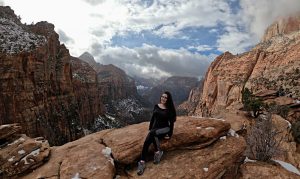 University of Florida College of Agricultural and Life Sciences alumna Ilana Korchia earned a Bachelor of Science degree in food science in 2019. She currently works as a law clerk at Marler Clark, The Food Safety Law Firm, and attends Seattle University School of Law.
University of Florida College of Agricultural and Life Sciences alumna Ilana Korchia earned a Bachelor of Science degree in food science in 2019. She currently works as a law clerk at Marler Clark, The Food Safety Law Firm, and attends Seattle University School of Law.
What first sparked your interest in your major?
Having grown up in a French household with a French father and a Lebanese mother, my childhood memories, more often than not, involve delicious food. In my first two years of undergrad, I studied biology, but I was equally interested in food and nutrition. After discovering the fascinating world of food science while reading Michael Moss’s “Salt Sugar Fat,” I decided to change my major to food science.
Was there a particular CALS faculty member that was influential in your career path?
Dr. Soohyoun Ahn helped me tremendously. Her class, Government Regulations and the Food Industry sparked my interest in the regulatory aspect of the food industry, and she introduced me to Stewart Watson, my mentor, friend, and former boss at the Food and Drug Administration (FDA). Dr. Keith Schneider helped me find my niche and my current job; as part of his Food Safety and Sanitation class, Dr. Schneider lectures about foodborne illness litigation and the law firm I currently work for, Marler Clark.
What do you find to be the best part of your job?
The best part of my job is that I get to use my scientific and legal background to seek justice for victims of food-borne illness. During my undergraduate studies, I knew early on that, unlike most of my peers, I did not want to work in a lab post-graduation. After spending a summer shadowing a trial attorney, I fell in love with law and decided to pursue a career path that would allow me to combine my two passions: food science and law. I feel fortunate to have found my dream job.
What are some exciting projects you have worked on in the course of your career?
As an intern at FDA, I partnered with a Miami-based law firm to create a webinar that helped women entrepreneurs worldwide comply with FDA’s Foreign Supplier Verification Programs so they could successfully import their food products into the United States. During my first few months at Marler Clark, I drafted a 61-page petition to the U.S. Department of Agriculture requesting that they issue an interpretive rule to declare certain Salmonella serotypes as adulterants in meat and poultry products. Currently, I’m working on food-borne illness cases arising out of the 2020 Fresh Express Cyclospora outbreak linked to bagged salads.
What advice would you give to students?
Don’t be afraid to steer off the beaten path. If no path exists, create your own. It’s never too late to change your mind about your career or to deviate from your original plan. You will spend countless hours working, so take the time you need to make sure those hours will be spent doing something you’re passionate about. Cultivate your network. Work hard, but never let go of your hobbies. Take time off. Take frequent breaks. Get outside and explore.

“Don’t be afraid to steer off the beaten path. If no path exists, create your own.”
– Ilana Korchia
Food Science is the study of techniques and systems to ensure food is safe, available, wholesome, and delicious. Food scientists use chemistry, biochemistry, microbiology, nutrition, and engineering to understand and manage food composition, processing, and safety. Find a CALS major that suits your interests by taking our majors quiz. You can also find information regarding our undergraduate and graduate programs on our website. Questions for Ilana Korchia regarding her experiences in food science should be directed to ilanakorchia@yahoo.com.
 0
0
